Cat Owner, Whose Terms Of Endearment For His Pet Look Like Nasty Insults, Has Other Pet Owners Sharing The Offensive Nicknames They Gave Their Furballs
Pet owners don't just stick to one name for their pets. They give them all sorts of nicknames inspired by how their furballs look or behave.
These monikers typically show a deep bond between the owner and their pet. From "Fluffy" and "Ginger" to "Crazy Pants" and "Jabba the Mutt," nicknames become a part of the pet's identity as much as the real name.
Pet owners can get quite creative with the nicknames they bestow upon their furry friends. Some of these monikers can be downright hilarious or even a little embarrassing, but they all come from a place of love and affection.
Others even give their pets the nastiest nicknames—ones that you wouldn't use on a person unless you want to downright disrespect them. A Redditor who recently posted on the "Am I The A**hole?" (AITA) is one of them.
Now, it wouldn't be a problem between him and his cat because even though he "insults" his cat, he says everything in a loving tone. Unfortunately, his girlfriend doesn't like his idea.
The girlfriend feels like the original poster (OP) is bullying his can, even though that isn't the case at all. He tells his girlfriend that while he's aware that cats can make sense of certain phrases, they don't understand English enough to feel insulted.
The OP uses nasty words as terms of endearment for his cat.

He owns a rescued kitten whom he loves so much.

His girlfriend also got a kitten. She is motherly toward her pet.

The Role of Language in Pet Relationships
The way we communicate with our pets can reveal much about our emotional states and attachment styles. Research from the Journal of Social Psychology indicates that pet owners often use affectionate language as a means of expressing love and bonding.
This form of communication can enhance the emotional connection between owner and pet, fostering a sense of companionship and security.
Conversely, when terms of endearment are perceived negatively, it can lead to confusion and misunderstandings.
The Psychology of Nicknames and Affection
Using nicknames for pets can be a reflection of affection and emotional bonding. Research in the Journal of Social Psychology suggests that creative and playful language can enhance emotional connections between owners and their pets.
However, the meanings behind these names can vary widely, sometimes leading to misunderstandings among other pet owners.
The Psychology of Pet Names and Affection
Research from the University of Toronto suggests that the way we communicate with pets can reveal underlying emotional bonds.
Using playful or teasing language can indicate affection and connection, even if the terms seem harsh to outsiders.
This aligns with attachment theory, which posits that the language we use can reflect our emotional investments.
When the OP's girlfriend heard how the OP calls his cat, she got mad. She accuses him of bullying the feline.
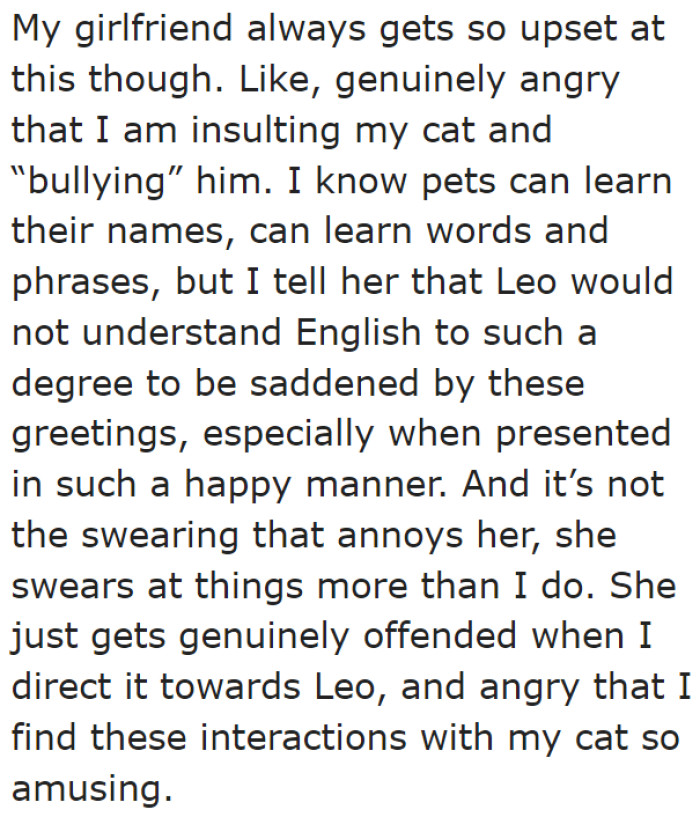
If the OP's girlfriend refuses to understand the real deal, then he just needs to call his cat "nasty things" when she's not around.
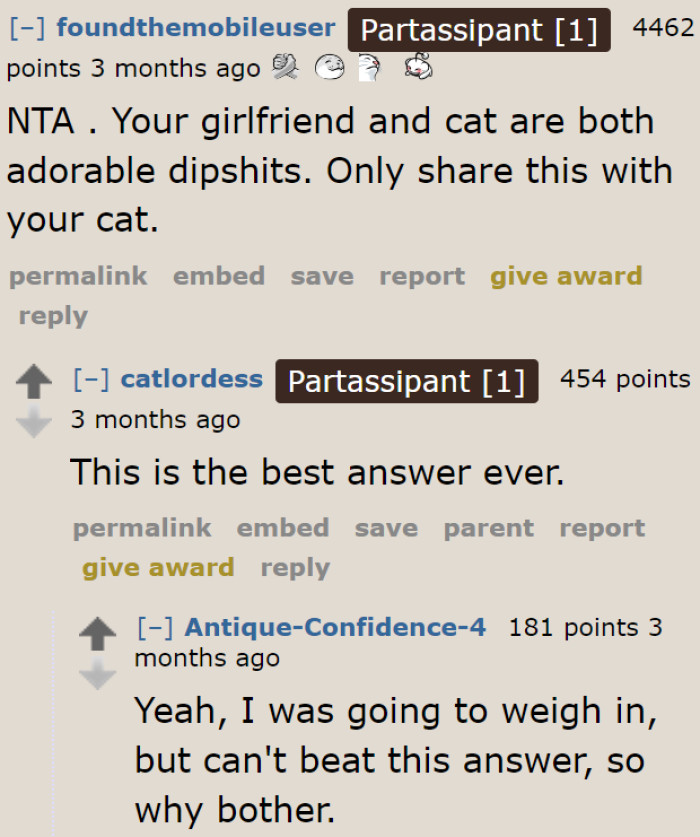
People started sharing the "insults" they call their pets.
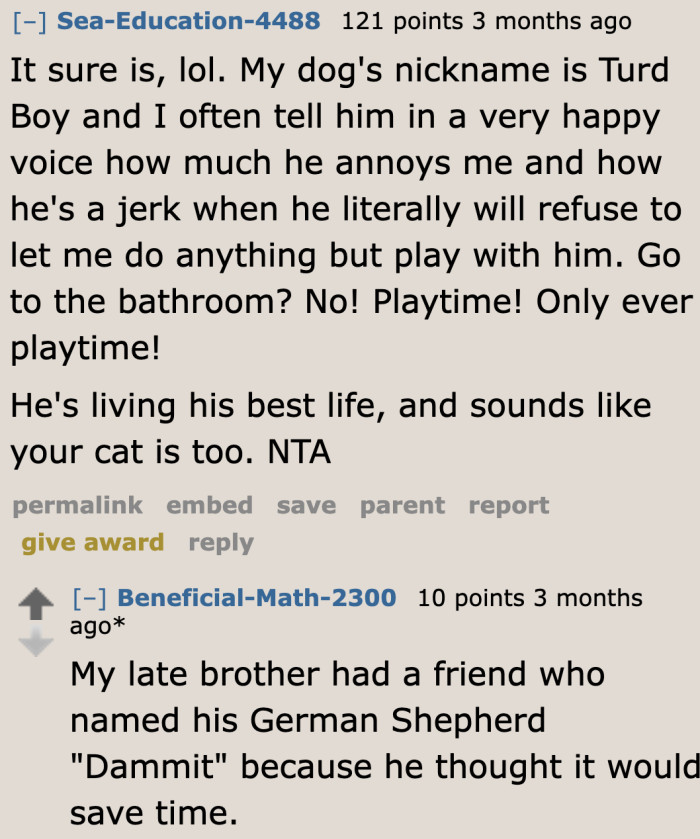
Moreover, the phenomenon of anthropomorphism—attributing human characteristics to animals—can influence how we interact with our pets. Studies show that pet owners often project their feelings onto their pets, which can enhance the emotional bond.
However, when the language used is perceived as harsh or insulting, it can create cognitive dissonance that affects the owner's emotional state.
This dissonance may lead to feelings of guilt or frustration, impacting the overall owner-pet relationship.
Interestingly, studies show that the way we label our pets can also reflect our personalities. A study published in the Personality and Individual Differences journal indicates that pet owners often choose names that resonate with their personal identities or social attitudes.
This connection can deepen the bond between owner and pet, making the relationship feel even more significant.
It's important to recognize that expressions of love can vary widely among individuals. A study published in the Journal of Social Psychology indicates that cultural factors play a significant role in how affection is communicated.
Understanding these nuances can help pet owners appreciate differing perspectives on pet names and terms of endearment.
Fostering an open dialogue about these differences can enhance mutual understanding among pet owners.
Others confess that they do the same thing as what OP's doing with his cat.
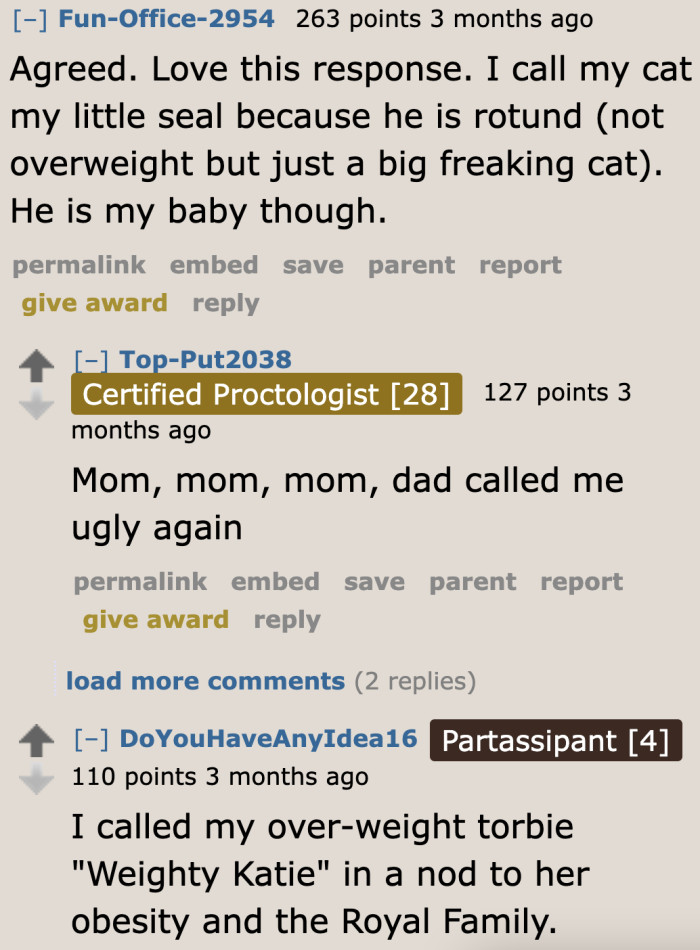
Those are some nasty nicknames.

This user said it right. It's the tone that counts, not the word.

Navigating Negative Perceptions
To address misunderstandings in pet communication, it's crucial to foster a positive environment. Research indicates that using positive reinforcement not only benefits pets' behavior but also strengthens the bond between owner and pet.
By focusing on positive interactions and affectionate language, owners can create a supportive atmosphere that enhances mutual understanding.
Moreover, discussing these perceptions openly with other pet owners can provide valuable insights into navigating the complexities of pet relationships.
Social Dynamics and Humor in Relationships
Humor plays a critical role in human relationships, including those with pets. Research published in the Journal of Personality and Social Psychology indicates that humor can enhance relationship satisfaction and provide a buffer against stress.
Using playful or seemingly offensive nicknames may be a way for pet owners to express their affection through humor, which can create a light-hearted atmosphere.
The Importance of Social Connections
Social connections can greatly influence how we perceive relationships with pets. Research from the Journal of Personality and Social Psychology indicates that individuals with strong social networks often report higher levels of happiness.
Sharing experiences and stories about pets can create bonds among pet owners, enhancing their sense of community and belonging.
Encouraging these interactions can foster a supportive environment for discussing diverse ways to express affection.
A Redditor confesses that they use their pet's nasty nicknames over the given name.

Cat thought its names were "Get Down" and "No, No, You Little S**t"
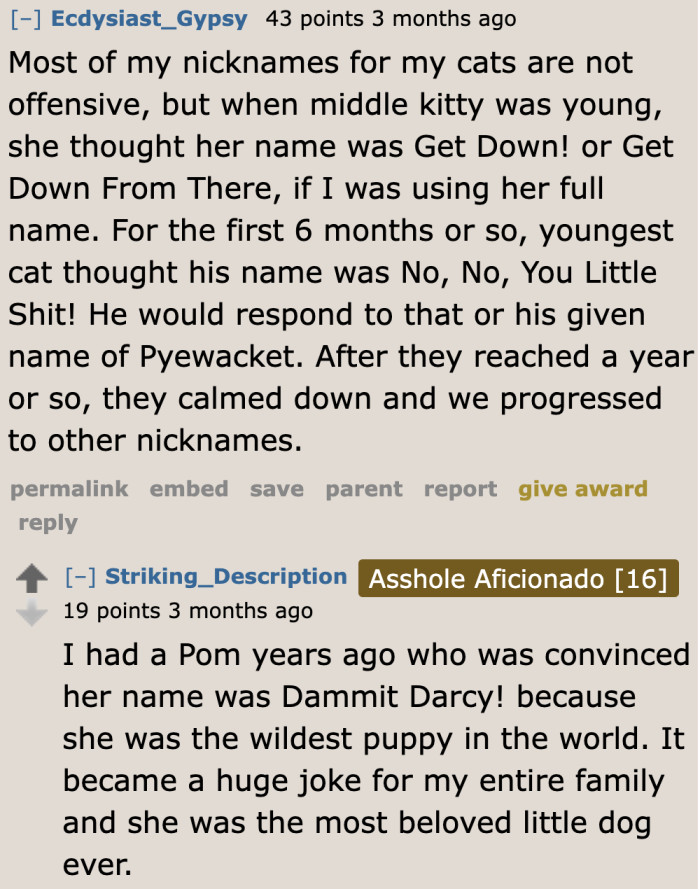
That's a really long name!

Additionally, exploring the emotional impact of language on pet behavior is essential. Studies show that pets can respond to the tone and emotional state of their owners, which can influence their behavior and overall well-being.
By being mindful of the language and tone used, pet owners can cultivate a more positive interaction that fosters trust and security.
Engaging in activities that promote bonding, such as training or play, can further enhance the relationship.
However, it’s essential to consider how this humor is perceived by others. Misunderstandings can arise when affectionate nicknames are interpreted negatively. A study in the Personality and Individual Differences journal highlights that individuals may react differently to humor based on their backgrounds and experiences.
This variability underscores the importance of context in social interactions.
Engaging in community pet events can also strengthen social ties. Studies show that participating in shared activities fosters connections and improves overall well-being.
Creating opportunities for pet owners to share their experiences can enhance feelings of belonging and reduce isolation.
Encouraging participation in local pet events can help foster a stronger sense of community among pet owners.
An excellent tip for when you need to relocate your cats.

Well, it looks like orange cats and bearded dragons have something in common.
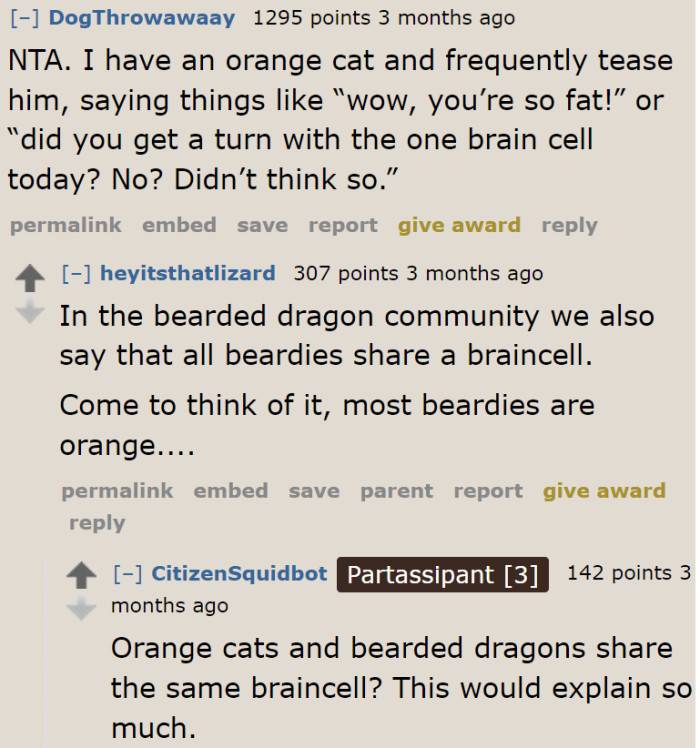
Pets responding to their silly nicknames.
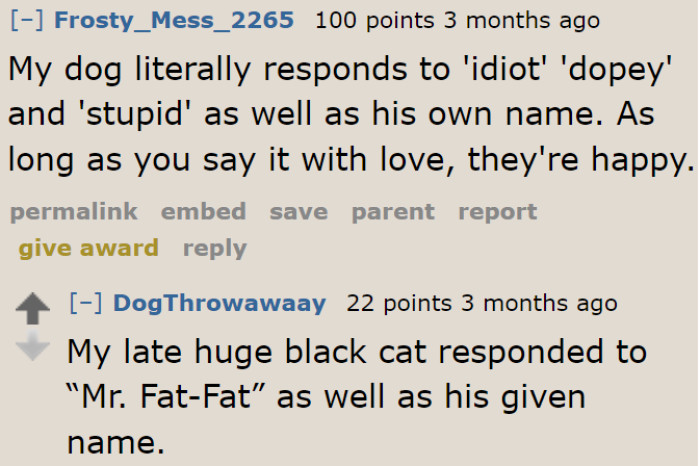
The Psychological Benefits of Pet Ownership
Research consistently shows that pet ownership can lead to psychological benefits, including reduced stress and increased happiness. A study from the University of California indicates that pet owners often experience lower levels of anxiety and depression.
This emotional support can be especially beneficial during challenging times, providing companionship and a sense of purpose.
Understanding the emotional dynamics involved in pet ownership can enhance the overall experience and strengthen the bond between owner and pet.
Navigating Social Sensitivities
When sharing pet nicknames, it's crucial to be sensitive to how others might perceive them. Research indicates that communication styles can vary widely, and what seems playful to one person might come off as offensive to another.
The Journal of Social Psychology suggests that understanding audience perceptions can help mitigate potential conflicts arising from miscommunication.
Proof that cats aren't bothered by the nasty English words.
They're bothered by something else, though.
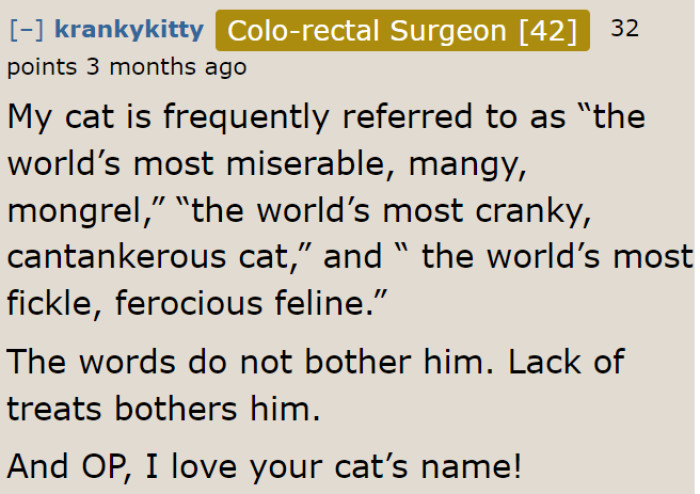
Aww, this mom's no fun.

Cats and the English language.

Lastly, recognizing the importance of communication in pet ownership can lead to more fulfilling relationships. Engaging in conversations about pet care and training not only improves understanding but also fosters a sense of teamwork.
Research from the Journal of Applied Animal Welfare Science emphasizes that cooperative strategies in pet care can enhance the emotional bond between owners and pets, leading to more harmonious relationships.
This collaborative approach can also promote better behavioral outcomes for pets.
To navigate these sensitivities, pet owners might consider explaining the affectionate intent behind their nicknames. By sharing the story or meaning behind a nickname, individuals can foster understanding and connection with fellow pet owners.
This approach can transform misunderstandings into opportunities for bonding and shared laughter.
The OP's girlfriend needs to have some sense of humor.
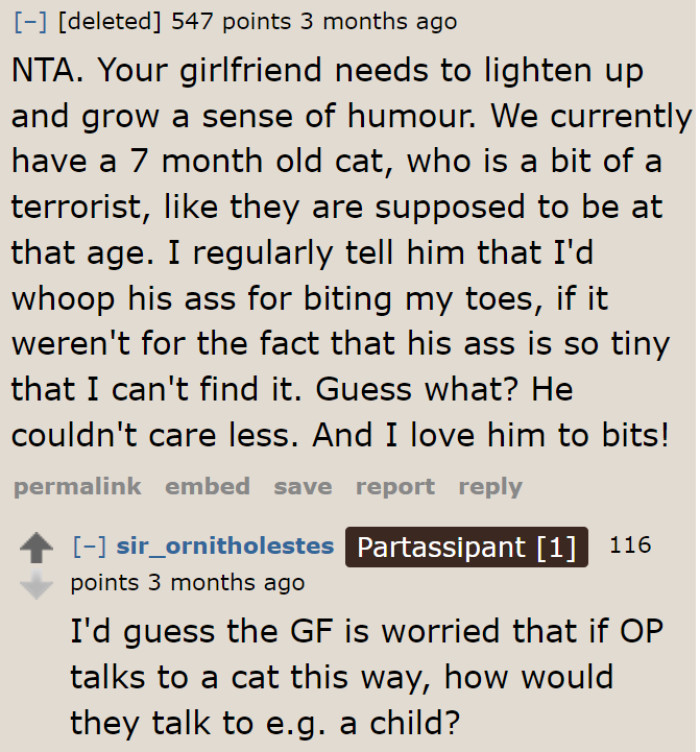
The girlfriend would probably be insulted if she were in this friend's shoes.
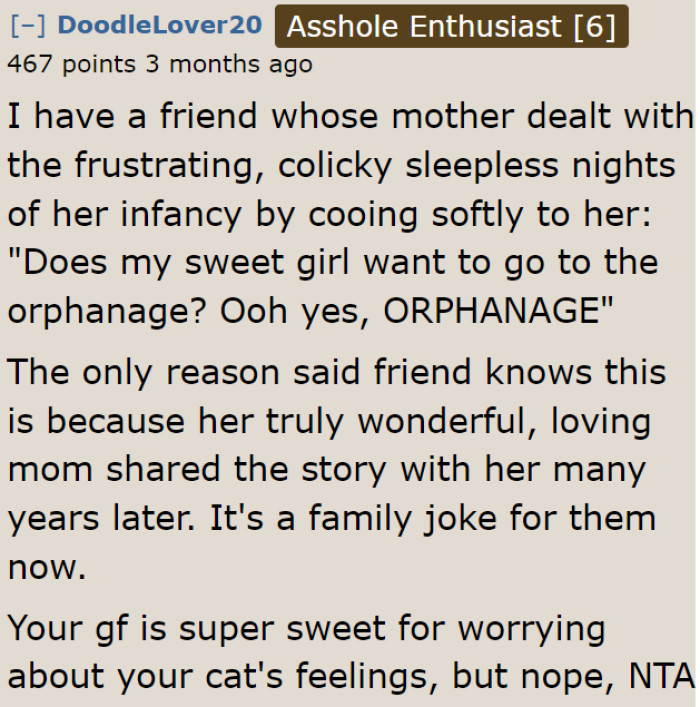
See? Pets don't understand English.
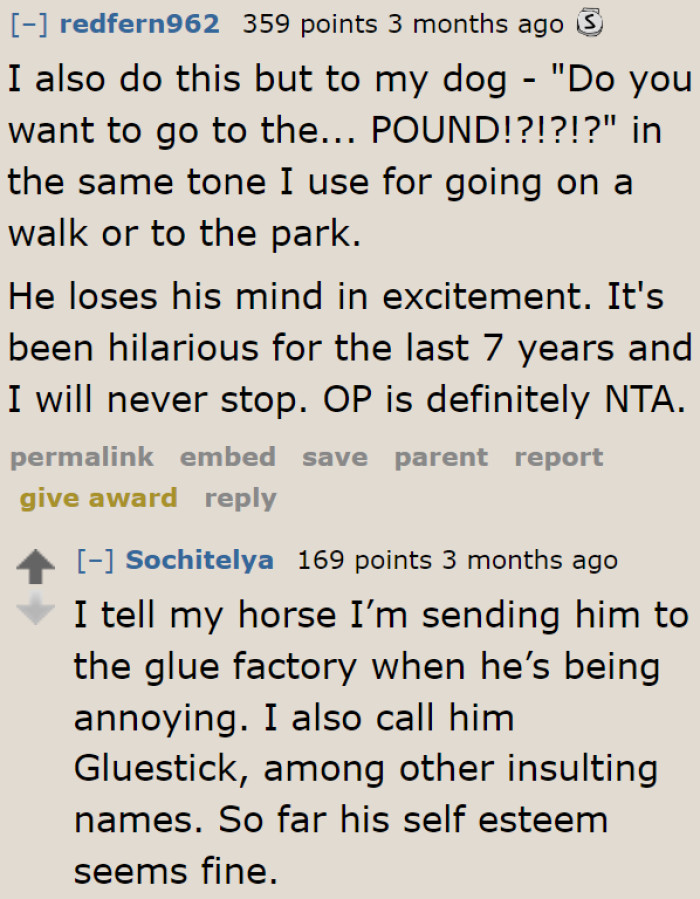
The Role of Shared Experiences
Shared experiences among pet owners can lead to deeper connections and understanding. Research in the Journal of Social Psychology shows that common interests, such as pet ownership, can facilitate friendships and community-building.
These connections can create a supportive network that appreciates the quirks of pet ownership, including the use of unique nicknames.
There's no harm done with the cat. So even if the OP continues to call his cat the nastiest names, it won't be a problem.
If it stresses his girlfriend out, maybe he only needs to say his unique terms of endearment whenever the girlfriend isn't around.
Do you also call your pets using offensive nicknames?
Psychological Analysis
This situation highlights the diverse ways individuals express affection towards their pets, often based on personal and cultural backgrounds.
By promoting understanding and dialogue about these differences, pet owners can foster a greater sense of community and connection.
Analysis generated by AI
Analysis & Alternative Approaches
Research emphasizes the variety of ways people express affection towards their pets and the importance of understanding these differences.
As psychological studies indicate, fostering social connections can enhance overall well-being and satisfaction among pet owners.
Ultimately, embracing humor and creativity in pet ownership can foster a sense of community among pet lovers. Cultivating an environment of acceptance and understanding can enrich social interactions and deepen the bonds between pet owners.
By celebrating the uniqueness of their relationships with their pets, individuals can create a positive atmosphere that invites connection.
Psychological Analysis
This scenario highlights the complexities of communication in pet ownership. The blend of humor and affection can sometimes lead to misunderstandings, particularly among those who may not share the same context.
Encouraging open discussions about the meanings behind affectionate nicknames can foster understanding and enrich social interactions among pet owners.
Analysis generated by AI
Analysis & Alternative Approaches
In conclusion, the interplay of affection, humor, and social dynamics in pet ownership can create rich and meaningful relationships. Understanding the psychology behind these interactions can enhance the bond between pets and their owners. As noted by Dr. Ramani Durvasula, clinical psychologist, "The way we relate to our pets often mirrors our interpersonal relationships, allowing us to express love and humor in unique ways." This sentiment is echoed by Dr. Pepper Schwartz, sociologist, who states, "Celebrating the unique aspects of our relationships, including those with our pets, can strengthen our connections and foster community."
Psychological Analysis
This situation highlights the nuances of communication in the human-animal bond. It's important for pet owners to reflect on how their language shapes their emotional connections with their pets.
By prioritizing positive interactions, owners can enhance the experience for both themselves and their pets.
Analysis generated by AI
Analysis & Alternative Approaches
In summary, the language we use with our pets plays a significant role in shaping our relationships with them. Clinical psychologists emphasize the importance of positive communication in enhancing emotional bonds and understanding.
By fostering a supportive environment and being mindful of language, pet owners can cultivate deeper connections with their pets.



